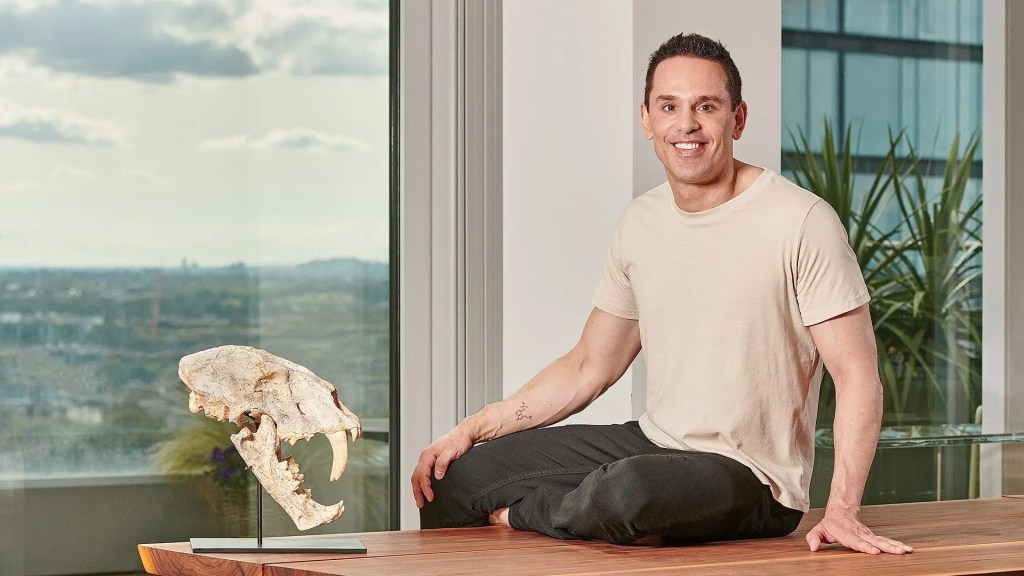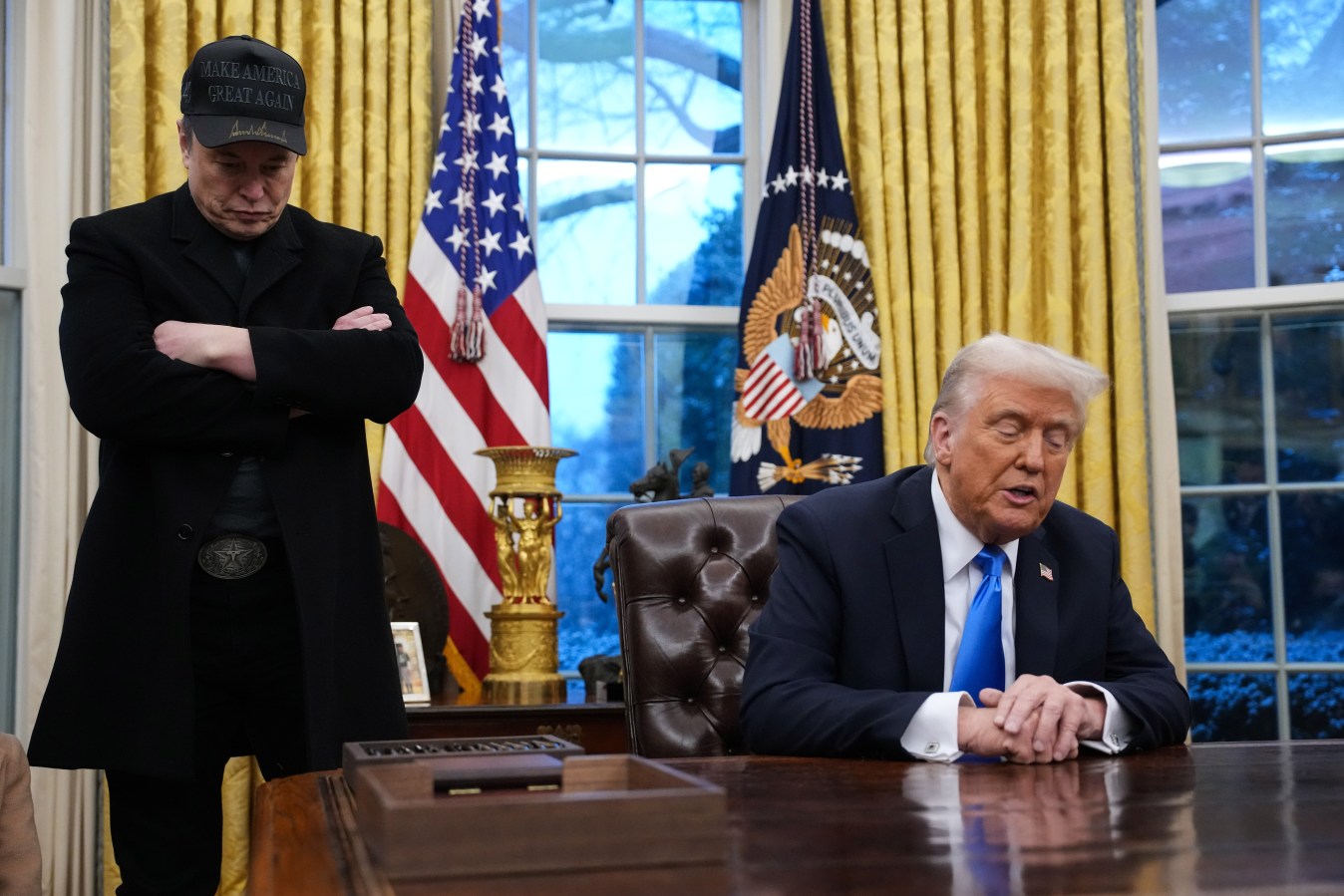Christian Angermayer is seemingly behind every flashy investment of the last decade. With boundless bravado and a roster of famous friends—including Peter Thiel, Uma Thurman, and the president of Rwanda—he’s getting ready to launch an Olympiad for athletes on steroids.

In a suite on the fourth floor of the Four Seasons in Austin, Texas, the German billionaire Christian Angermayer is talking about his newest investment: the Enhanced Games, a 21st-century Olympics on steroids—literally.
A year ago, when Angermayer’s friend Aron D’Souza, an entrepreneur and the lawyer who worked with Peter Thiel to take down Gawker Media, mentioned he wanted to disrupt the Olympics by launching a major sporting event that allows athletes to dope with performance-enhancing drugs (under a doctor’s supervision), Angermayer thought the idea was brilliant.
“I look at the world through the lens of ‘what’s the business model, or how can we make money?’” he says while a stylist puts some light makeup on his face and perfects his jet-black hair before an appearance on The Joe Rogan Experience. “I said, ‘Hey, that’s a multibillion-dollar idea.’”
The 46-year-old Angermayer, who is worth $1.1 billion and invests through his family office, the Malta-based Apeiron Investment Group, has sunk about $2.5 million into the Enhanced Games. Thiel and Balaji Srinivasan, the Silicon Valley venture capitalist and cryptocurrency entrepreneur, also invested in the project. The organization, which will feature a $1 million prize to whoever breaks the 100-meter-sprint world record and the 50-meter-freestyle world record in swimming, hopes to launch its first competition in 2025 with five sports. While the Olympics have had a 3,000-year head start, Angermayer, with the bravado of a gold medalist, believes that an international sporting event that allows steroids and other drugs with a focus on pushing the limits of human potential will easily surpass the ancient games.
“Humans are wired to want to see the fastest man or woman,” he says. “They don’t want to see the fastest natural man.”
He says the Enhanced Games will be broadcast live, possibly from an arena or a soundstage, and he has no doubt it will be a success. The London-based company is in talks to raise $300 million.
“It’s going to be one of the biggest sports franchises out there,” he continues with unbridled optimism over a meal of scrambled eggs and smoked salmon in his suite. “If we do that, it’s going to be worth $5 billion to $10 billion. I could dream bigger, but that’s realistic.”
Of course, many of Angermayer’s projects don’t seem realistic, or even possible, at first blush. His sui generis investment portfolio, which is mostly held through Apeiron ($2.5 billion in assets under management), ranges from crypto mining to psychedelic drugs to dinosaur fossils to brain implants—but don’t call him faddish.
“If I’m faddish, then I created the trend,” says Angermayer, who has a tattoo of the chemical structure of psilocybin, the psychoactive compound in magic mushrooms, on his right forearm. “I’m spotting things very early.”
Private equity–cum-crypto billionaire Mike Novogratz, who wrote the first check (alongside Angermayer and Thiel) to Compass Pathways, a British biotech conducting clinical trials on psilocybin, says Angermayer’s real superpower is networking.
“His ability to connect people with capital and opportunities is extraordinary,” says Novogratz, who has invested alongside Angermayer in other ventures, including the controversial crypto company Block.One and ATAI Life Sciences, a psychedelic drug startup Angermayer founded, which hopes to gain FDA approval to treat mental illnesses. “He is a stunning networker.”
The 59-year-old Novogratz met Angermayer in 2010 when he was advising U.S.-based funds with investments abroad, pro bono, about how to deal with the European financial crisis. A member of the German Parliament was in tow.
As he does with fad, Angermayer bristles at the word networker. Too many people network solely to get what they want out of others, he says. For a man who need not work ever again, he has dedicated time and effort to create what he calls a “diverse life” filled with friends who run or used to run countries (former German Chancellor Angela Merkel), star in Hollywood films (Uma Thurman) or make more money than he does (Novogratz and Thiel). “I would say if you wanted to call it networking, look at it the same way as with money,” he says. “It’s about the power of compounding.”
And as often as he can be spotted behind many zeitgeist-y investments of the last decade, he also makes cameos in high-profile scandals. It was Angermayer who, in 2019, brokered a $1.1 billion investment by SoftBank into the now-insolvent German payments company Wirecard, which collapsed after auditors reported the company was missing $2.1 billion in cash. For that, Angermayer was paid around $12 million. “I literally just made the introduction,” Angermayer says. “I agreed on a 1% fee, which is not even high, by the way.”
During Angermayer’s 40th birthday party in 2018 at a friend’s castle in Austria, he reportedly introduced Thiel to Daniil Bisslinger, a Russian who works for the Kremlin’s Ministry of Foreign Affairs. Thiel, according to Business Insider, which broke the story, reported the meeting to the FBI, saying that Bisslinger invited him to speak at a conference in St. Petersburg and offered a meeting with Vladimir Putin. Bisslinger apparently reached out to Thiel again with the same offer to meet Putin in 2022. (Thiel did not respond to a request for comment.)
The ensuing scandal is “so absurd,” Angermayer says, explaining that the whole narrative was made up. “I had a birthday party. I had two friends. They met each other there,” he says. “Whatever friends of mine do, it’s not my thing.”
Raised in the 200-person village of Triebendorf, Germany, not far from the Czech Republic, Angermayer has come a long way from his humble beginnings. His father worked in construction; his mother, before staying home to raise him, was a secretary. He was obsessed with business from a young age. Having learned how to write in grade school, his first project was creating an invoice, which his mother apparently still has. When he was 6, his parents took him to the Care Bears movie. Young Christian loved the film, but he was even more fascinated that his parents paid for a ticket. When they returned home from the theater, he took the remote control, wrote up a price list and started charging his mother and father to watch TV.
“My parents were really worried,” he says. “Now they’re proud, but [at the time, they thought] ‘What did we do wrong?’ ”
Angermayer’s life would be good fodder for a German fairy tale about entrepreneurs, by his telling. In 1998, he was admitted to the University of Bayreuth, and within the first month he met two professors, Stefan Limmer and Roland Kreutzer, who were working on a novel gene-targeting technology called RNA interference. The academics then started a company with Angermayer called Ribopharma AG. While the smart, scrappy 21-year-old had only a small stake, Ribopharma was backed by the German government, enabling Angermayer to drop out of school. In 2003, Ribopharma merged with a Massachusetts-based company, Alnylam, which later went public. At 25, Angermayer was a multimillionaire.
While still in his 20s, he made a connection that would later pay off handsomely. He became close with Golo Quandt, a member of one of Germany’s richest families. After Ribopharma, Angermayer had cofounded a financial services firm called Angermayer, Brumm & Lange Group with two college friends. ABL had a hard time raising money until, starting in 2004, Quandt invested an estimated $40 million across a series of companies.

If that weren’t enough, in 2007, a friend of Angermayer’s who worked for Germany’s foreign ministry asked if he would host a dinner for Paul Kagame, the president of Rwanda. Angermayer and Kagame hit it off, and a few weeks later, he was invited to visit Kigali, Rwanda’s capital.
During his trip to Rwanda—which Angermayer calls the “Singapore of Africa” due to its business-friendly atmosphere—he told Kagame that he wanted to invest in the country. Kagame told him a small bank, the Banque Rwandaise de Développement, was for sale. “I literally came home and bought a bank for $10 million,” he recalls.
He then created the African Development Corporation, a Frankfurt-based banking group, and hired a CEO who executed a rollup of regional banks across nearly a dozen countries on the continent. In 2014, Angermayer and his partners sold ADC to the disgraced former CEO of Barclays, Bob Diamond, and his African financial firm, Atlas, in a deal that included another banking outfit for more than $265 million. Angermeyer says he had a 15% stake in ADC at the time.
Kagame, who appointed Angermayer to his Presidential Advisory Council, has a lot of respect for the investor. In an email to Forbes, he praised Angermayer’s “optimistic view of the future” and his ability to create “megatrends.”
By the time he cashed out of ADC, Angermayer, then 36, had struck out on his own with a new investment firm, Apeiron, and focused on how he wanted to live his life. “I just want to do things which really, truly fascinate me,” he says.
“Happiness and longevity are, for me, the most natural products. You won’t find anyone who says, ‘I don’t want to be happy’ and ‘I don’t want to be healthy.’”
Known as a teetotaler—he claims he has drunk just a few drops of alcohol—Angermayer was persuaded by a friend to take magic mushrooms while on a Caribbean vacation in 2014.
“It was the single most important experience of my life,” he says.
After the trip, he visited Novogratz in New York and told him that mushrooms have the potential to become a blockbuster pharmaceutical drug. Three days later, in a sheer coincidence, a man named George Goldsmith came into Novogratz’s office and pitched a business to develop psilocybin into a depression medication. Novogratz, Thiel and Angermayer invested $1 million each into the London-based company, Compass.
A few years later, in 2018, Angermayer started his own psychedelics firm, ATAI Life Sciences, which he took public on the Nasdaq in 2021. He owns a 20% stake, currently worth $44 million. ATAI is conducting clinical trials on a suite of psychedelics, from DMT to ibogaine to MDMA. In all, Angermayer has invested $40 million in the company. “If we succeed, and if we medicalise psychedelics, ATAI will be a double-, triple-digit billion-dollar company,” he says.
Somewhere along the line, he also got into Bitcoin. He still owns about 1,000 of them, worth about $58 million at the current price of $58,000. He’s a true believer who thinks a single Bitcoin will eventually be worth $1 million. “People overcomplicate Bitcoin,” he says. “It’s digital gold.”
He also believes that science will eventually be able to keep humans from aging, predicting that living to 100 will one day be common. To that end, he cofounded two longevity companies, Zurich-based Rejuveron and Cambrian Bio in New York. Both are developing FDA- approved medications to help people delay aging. His investment thesis—as futuristic as it is optimistic—is hard to refute: Sell long-term health and vanity. “Happiness and longevity are for me the most natural products,” Angermayer says. “You won’t find anyone who says ‘I don’t want to be happy’ and ‘I don’t want to be healthy.’”
As always, he is his own best marketing message. He looks much younger than his 46 years. He says he takes a “stack” of performance-enhancing drugs, although he won’t reveal his formula; he wants people to go to a doctor and get professional advice, as he does. He also undergoes psychedelic assisted therapy once or twice a year in a country where it’s legal. “It’s like a broad-spectrum antibiotic for your brain,” he says. Other biohacks include taking modafinil, the non-amphetamine stimulant used to treat narcoleptics, to combat jet lag. He is also not shy about saying he uses Ozempic for weight loss even though he is quite trim. “It’s outsourced discipline,” he told Rogan in June.
For a man so focused on the future, Angermayer has a passion that’s deeply buried in the past: collecting dinosaur bones. He hires “literal cowboys” for his venture in Montana to prospect for and dig up fossils. His collection includes a Diplodocus, one of the largest Triceratops ever found and a young T. rex, which he says is worth $40 million. (He named it “Chomper” in homage to Don Bluth’s The Land Before Time.) “It’s a little bit like oil drilling,” he says. “I got hooked on it, and it’s an amazing investment.”
Overall, Angermayer’s portfolio has been a bit of a mixed bag lately. He says certain investments, like Blackrock Neurotech, a Utah-based brain-computer interface company and Canadian artificial intelligence–powered drug discovery firm AbCellera, have resulted in a 5x return. Block.One, the crypto company, netted $70 million for his investors, he says, while his hedge fund, Jiva Peak, which is focused on small- to mid-cap biotech stocks, posted a 59% return between its November 2023 launch and this spring.
But some of his publicly traded positions have taken a beating. ATAI, which went public in June 2021 at nearly $20 a share, is currently trading for less than $1.30, only a little north of the minimum $1 it needs to stay listed on the Nasdaq. Angermayer blames biotech stocks’ falling out of favor on rising interest rates. That’s not entirely unreasonable, but while the Nasdaq biotech index is down 13% since ATAI went public, ATAI shares are down 92%. “I could name 50 companies in biotech that are doing really, really well and are trading 90% down,” Angermayer says. “I didn’t do anything wrong.”
It’s a similar, if marginally less bleak, story with Northern Data, a Germany-based bitcoin miner. Northern Data has more than halved from about €60 in 2020, when Angermayer took a position, to nearly €17 today. In June, the former COO and CFO of the company’s U.S. subsidiary filed a wrongful-termination lawsuit alleging Northern Data was misrepresenting its financial condition and evading taxes. Northern Data said it “refutes the allegations in the strongest terms” and suggested that the lawsuit is “financially motivated.” The whole industry has struggled since its pandemic peaks, but even compared just to a group of large cryptocurrency miners like Marathon Digital Holdings, Riot Platforms, CleanSpark, Hut 8 and Iris Energy, Angermayer’s investment doesn’t look good. Over that period, Northern Data is down 79%, the worst among the bunch. “I think Northern Data has a massive disadvantage of being listed in Germany, and I hope the management is changing that soon and doing a U.S. listing,” Angermayer says in an email, sharing a screenshot from his Bloomberg Terminal showing that the company has outpaced Marathon—if you use a shorter time frame starting in November 2022.
JURASSIC ASSETS
When Christian Angermayer is not funding futuristic companies, he’s digging into the past. Over the last few years, the Germany-born entrepreneur has been paying paleontologists to excavate dinosaur fossils in Montana and other sites in the U.S. “It’s a little bit like oil drilling—it takes 1.5 years to dig it out and 1.5 years to clean,” he explains. “It’s a passion; I love dinosaurs. I got hooked on it and it’s an amazing investment.” Dinosaur fossils have become a new asset class for the ultrawealthy in the past decade—in 2022, a Deinonychus, which inspired the velociraptors in Jurassic Park, sold for $12.4 million, and Maximus, a T. rex skull, went for $6 million the same year—and Angermayer wants a piece of the market. His collection includes a juvenile T. rex, a Diplodocus and one of the largest Triceratops ever found. “It’s definitely the most scarce [asset],” he says. “It has a lot of emotional value too.”

In the case of ATAI, Novogratz insists that even though the stock has collapsed, Angermayer deserves credit for creative thinking and raising money to explore whether psychedelics can help address the global mental health crisis. According to Novogratz, Angermayer “raised more capital for the psychedelic space in the first nine months we were together than the whole space raised in the previous 25 years.” Novogratz remains bullish about the company’s prospects, even though the value of his stake fell from $170 million shortly after the initial public offering to less than $15 million today. “Nobly, or unfortunately, depending on how you want to think about it,” he says, “I didn’t sell any of my shares.”
Setbacks aside, there is always more zeitgeist investing to be done. Among the topics Angermayer is thinking about is how the transgender rights movement is creating more bodily autonomy for people and how humans have replaced religion with other forms of worship, from sports to celebrity. He regards Swifties, for instance, as a powerful new cult. Angermayer’s bullet train of thought then brings him to a hypothetical investment idea: What if you could buy an index of the world’s top 20 A-list celebrities? His thesis hinges on the idea that trust in institutions is crumbling, and people are turning instead to the rich and famous.
“If you say whom do you trust more, the U.S. government or Taylor Swift? I think 90% would say Taylor Swift,” he says. And while that celebrity index might not exist just yet, Angermayer lets drop that he’s about to start a new business—with his friend Uma Thurman.
This article was originally published on forbes.com and all figures are in USD.
Look back on the week that was with hand-picked articles from Australia and around the world. Sign up to the Forbes Australia newsletter hereor become a member here.


